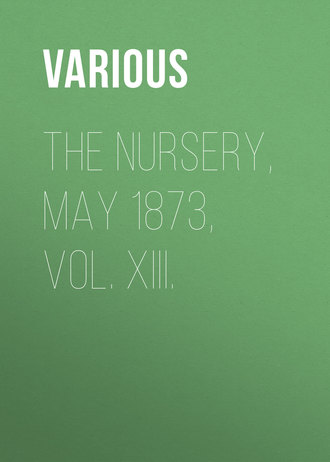
Various
The Nursery, May 1873, Vol. XIII.
GUESS
I see two lilies, white as snow,
That mother loves and kisses so;
Dearer they are than gold or lands:
Guess me the lilies,—baby's hands!
I know a rosebud fairer far
Than any buds of summer are;
Sweeter than sweet winds of the south:
Guess me the rosebud,—baby's mouth!
I've found a place where shines the sun:
Yes, long, long, after day is done;
Oh! how it loves to linger there:
Guess me the sunshine,—baby's hair!
There are two windows where I see
My own glad face peep out at me;
These windows beam like June's own skies:
Guess me the riddle,—baby's eyes!
George Cooper.
PRINCE AND TIP
Prince is a small shaggy dog, of a light-brown color. Tip is also a small dog, but is black, and has short, smooth hair. They are very fond of each other, and frolic together like two kittens.
Prince is always making acquaintances. He has several places in the neighborhood where he makes himself at home. He is always welcome, and he knows it: so he comes and goes as he pleases. Even when his master ties him, he cannot be kept from visiting his friends.
It was for a long time a wonder to us how he got untied; but we kept watch one day, and found that Tip, with his paws and mouth, loosened the knot, so that Prince could slip his head out; and then the two dogs scampered off in great glee. Prince, or Pinny, as we call him, plays some funny tricks. When we tell him to shake hands, he stands up on his hind-feet, and gives first his right, and then his left paw.
Sometimes we say to him, "Now, Pinny, play sick." Then he lies down, droops his head, and puts on a woe-begone look. We run around him, saying, "Poor Pinny!" and he all the while seems to enjoy the joke. As soon as we say, "Up Pinny, all well," he jumps up, shakes himself, and gives a knowing look, which seems to say, "Didn't I do that well?"
When we tell him to play beggar, he sits up on his haunches, raises his fore-paws, and whines dolefully.
When we hear a noise, and say, "See if anybody's coming, Pinny!" he goes to the door, and listens: if any one is coming, he barks loudly; if not, he comes quietly back.
Sometimes the two dogs play horses. Their master takes a rope a few feet long, and ties one end around Pinny's neck, and the other around Tip's. Then, when the word is given, they set off and gallop up the road abreast, like two ponies. When their master whistles, they turn round, and come back.
Sometimes they are harnessed to a little wagon; and the children take turns in having a ride. The dogs seem to enjoy it as much as the children. They are impatient to start; but they wait for each other to be harnessed: they are not in quite such a hurry as the dog in the following picture.
Gertie Adams.
MISTRESS MOUSE
Mistress Mouse
Built a house
In mamma's best bonnet.
All the cats
Were catching rats,
And didn't light upon it.
At last they found it,
And around it
Sat watching for the sinner;
When, strange to say,
She got away,
And so they lost their dinner.
THE NAPOLEON VIOLETS
There are three profiles of famous persons to be found among the outlines of this picture, which was drawn as long ago as the year 1815. One of the profiles is of Napoleon Bonaparte, a great soldier, who made himself emperor of France; another profile is of his wife, Marie Louise; and another of his son, Napoleon Francis Charles Joseph Bonaparte, styled King of Rome, and by his father proclaimed Emperor of the French, under the title of Napoleon II., in the year 1815, when he was only about four years old.
Owing to the defeats and disappointments of his father, the child Napoleon never actually became either King of Rome, or Emperor of France. He died in the year 1832, in Austria, where his grandfather was emperor.
Now, which of our readers will be able to discover the three portraits hidden in this symbolical bunch of violets?
"Oh, dear! What a big word is this! What does Uncle Charles mean by symbolical?" I fancy some of my little friends will exclaim. Well, then, a symbol is merely a sign, or mark, by which one knows a thing. When you see an umbrella in a man's hand, it is a symbol, or sign, that he expects a shower. So the profiles in this bunch of violets make it symbolical; that is, suggestive of a family group, who, it was hoped, would be renewed like the violets, and once more fill a large space in the history of France.
Uncle Charles.


